The efficacy of NP11-4-derived immunotoxin scFv-artesunate in reducing hepatic fibrosis inducedby Schistosoma japonicum in mice
The efficacy of NP11-4-derived immunotoxin scFv-artesunate in reducing hepatic fibrosis inducedby Schistosoma japonicum in mice作者机构:Key Labortary of Antibody Technique of Ministry of Health Nanjing Medical University Nanjing Jiangsu 210029 China Pathology Department Nanjing Medmal University Nanjing Jiangsu 210029 China Jiangsu Institute of Parasitic Diseases Wuxi Jiangsu 214000 China Huadong Medical Institute of Bioteehniques Nanjing Jiangsu 210002 China
出 版 物:《The Journal of Biomedical Research》 (生物医学研究杂志(英文版))
年 卷 期:2011年第25卷第2期
页 面:148-154页
学科分类:090603[农学-临床兽医学] 0710[理学-生物学] 071010[理学-生物化学与分子生物学] 081704[工学-应用化学] 07[理学] 08[工学] 0817[工学-化学工程与技术] 09[农学] 0906[农学-兽医学]
主 题:Schistosoma japonicum scFv immunotoxin hepatic fibrosis
摘 要:Schistosomiasis is one of the most prevalent parasitic diseases in China, and hepatic fibrosis caused by schistosome infection is the principal cause of death. The aim of this study was to evaluate the efficacy of NPll-4- derived immunotoxin scFv-artesunate on Schistosoma japonicum-induced hepatic fibrosis. A single-chain variable fragment (scFv) was generated from the murine anti-Schistosoma japonicum (S. japanicum) monoclonal antibody NP11-4. The scFv was expressed as a soluble protein and purified by Ni-affinity chromatography. After conjuga- tion with artesunate, the binding ability with soluble egg antigens (SEA) was determined by an enzyme-linked immunosorbent assay (ELISA). The biological activity of purified scFv, scFv-artesunate (immunotoxin), and artesunate was detected in vivo. Image-Pro Plus software was used to analyze the size of egg granuloma and the extent of liver fibrosis. The recombinant scFv expession vector was constructed and expressed successfully. After purification by a His-trap Ni-affinity column, the scFv yield was approximately 0.8 mg/L of culture medium. ELISA results showed that chemical conjugation did not affect the binding activity of the immunotoxin. Our animal experiments indicated that the immunotoxin could significantly reduce the size of egg granuloma in the liver and inhibit hepatic fibrosis. The immunotoxin could be used as a promising candidate in the targeted therapy of S. .japonicum-induced hepatic fibrosis.



